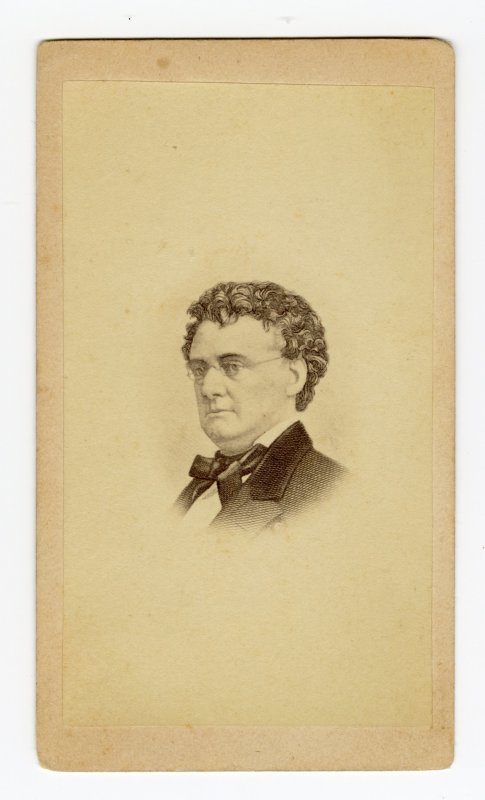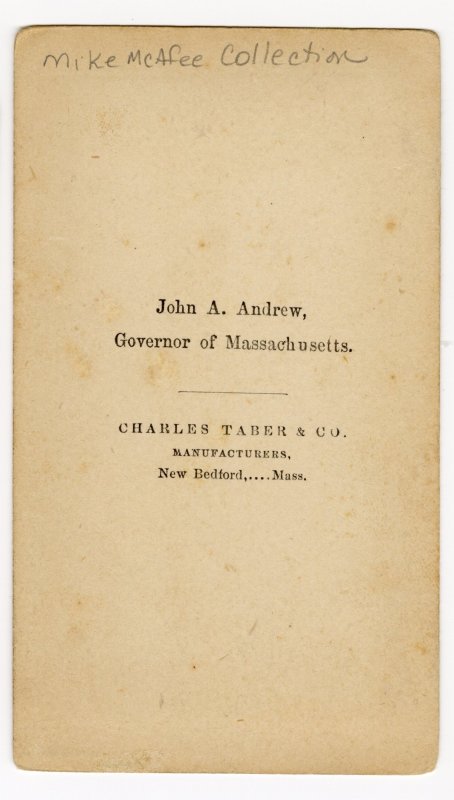War Governor of Massachusetts
Item CDV-10648
John A. Andrew
Price: $145.00
Description
War Governor of MassachusettsJohn A. Andrew
Backmark: NewBadford, MA
CDV is from the Mike McAfee Collection
War Governor of Massachusetts
When John A. Andrew took office on January 2, 1861, on the eve of the American Civil War, the Albany Argus called him "a lawyer of a low type and a brutal fanatic" who "proposes to maintain the condemned [personal liberty] statutes of [Massachusetts], and to force upon the South by arms, an allegiance to the Constitution thus violated." In the early war years that followed, Andrew was a persistent radical voice, pressuring President Abraham Lincoln on the conduct of the war and the need to end slavery.
Shortly after taking office, Andrew began to ready the Massachusetts militia for duty, promoting younger and more vigorous leaders, and contracting for updated armaments, equipment, and supplies. He also wrote to the governors of Maine and New Hampshire, urging them to also step up preparations. Once hostilities broke out, he also took the lead to update the state's coastal defenses, which were in poor condition and largely obsolete. Taking this step without federal authorization or funding, he secured bank loans from major Boston banks to fund the effort in the interim. With the war already underway in late 1861, Andrew engaged in a highly public dispute with General Benjamin Franklin Butler, who sought to appoint officers of regiments he recruited. Andrew ended up winning in the disagreement, and (in a response viewed at the time as somewhat petulant) refused to appoint any of Butler's choices to those positions.
Andrew was a regular voice, although somewhat muted in public statements, in the drive to declare an end to slavery. When Lincoln announced his preliminary Emancipation Proclamation in September 1862 (shortly after the Union victory in the Battle of Antietam), Andrew was supportive, but called it "a poor document but a mighty act", and complained that it was too limited in scope and late in becoming effective. Andrew was one of the leading state executives at the Loyal War Governors' Conference in Altoona, Pennsylvania, held in late September 1862, which ultimately backed the Emancipation Proclamation and the continued war effort.
Andrew was a leading force in promoting the enlistment of black men as uniformed soldiers in the Union Army, although the state legislature was at first reluctant to authorize it. Abolitionist Frederick Douglass had advocated this from the start of the war, and Andrew viewed it as a necessary equalizing step, and a means to fill the state's enlistment quotas with something other than factory workers. After lobbying the administration, Andrew was granted permission to raise a black regiment in January 1863. Due to Massachusetts's small black population, the 54th (and then also the 55th) Massachusetts were composed of blacks recruited not just from Massachusetts, but also Ohio, New York, Pennsylvania, and other states. Andrew wanted the regiments to be staffed by black officers, but this was rejected, and their officers were instead hand-picked by Andrew from strong abolitionist circles. He was also supportive of efforts by the recruits to receive equal pay; he offered them money from the state to do so, but they refused, holding out for equal pay from the federal government. He was somewhat less receptive to the relocation of freed slaves to Massachusetts, objecting to a plan to send 500 of them to Massachusetts from South Carolina in 1862.
By the end of the war, Andrew's politics had moderated. In late 1865, he expressed support for the Reconstruction policies of President Andrew Johnson, resulting in a split with his longtime political ally Charles Sumner. The party split was such that Andrew was considered as a potential candidate for Sumner's Senate seat, but he rejected the possibility. With the war at an end in 1865, he decided not to run for reelection. In his final speech to the state legislature in January 1866 he outlined his vision of how Reconstruction should proceed, significantly diverging from the Radical agenda by not making black suffrage a prerequisite for the readmission of rebel state legislators to Congress. He had in part acted on private efforts to aid in the reconstruction of the south in 1865, forming a land agency as a clearing house for Northerners seeking to invest in the southern properties.
Andrew was elected a 3rd Class Companion (honorary member) of the Pennsylvania Commandery of the Military Order of the Loyal Legion of the United States in recognition of his support of the Union during the Civil War.
Source: Wikipedia


